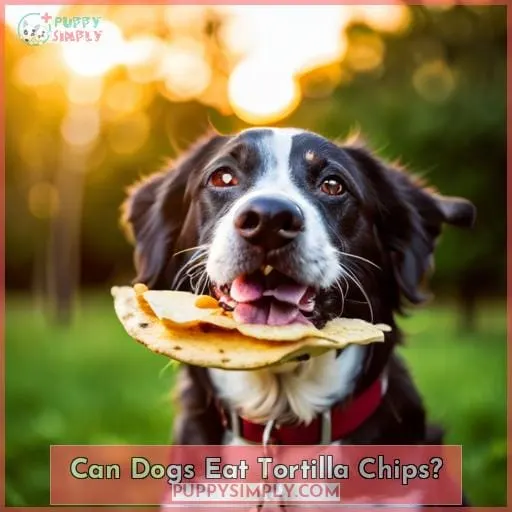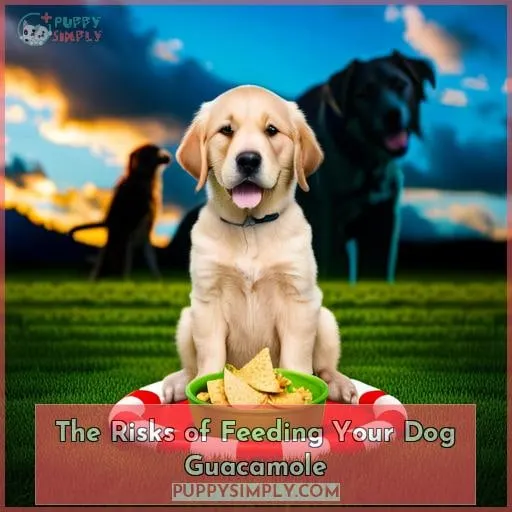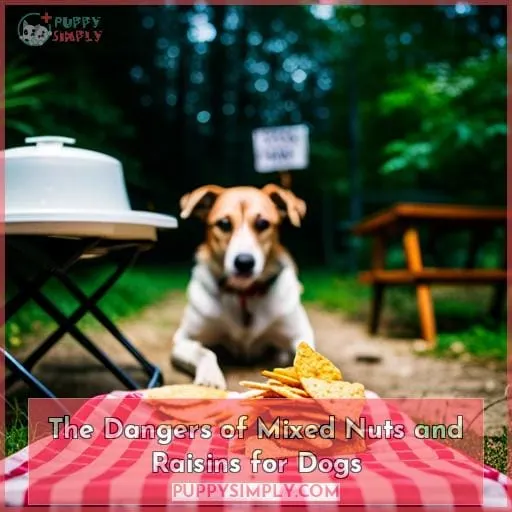This site is supported by our readers. We may earn a commission, at no cost to you, if you purchase through links.
As a pet owner, you want to make sure that your furry friend is healthy and happy. Unfortunately, some human snacks can be dangerous for dogs if they consume them in large quantities or too frequently.
This article will explore the risks of feeding your dog tortilla chips and answer the question: can dogs eat tortilla chips? You’ll learn why regular consumption of these crunchy treats may not be good for their health as well as other similar snacks including Doritos and corn chips.
We’ll also discuss what to do if Fido does sneak in a few extra pieces from time-to-time!
Table Of Contents
- Key Takeaways
- Why Some Human Snacks Are Dangerous for Dogs
- The Risks of Feeding Your Dog Guacamole
- The Dangers of Mixed Nuts and Raisins for Dogs
- Why Ice Cream and Alcohol Are Not Safe for Dogs
- The Harmful Effects of Candy and Gum With Xylitol
- Safe Table Foods for Dogs to Eat
- Can Dogs Eat Tortilla Chips?
- Frequently Asked Questions (FAQs)
- Conclusion
Key Takeaways
Tortilla chips, especially cool ranch Doritos, contain high levels of sodium and fat that could harm a dog’s health over time. Avocados, nuts, raisins/grapes, and sugary treats containing xylitol are dangerous for dogs and should never be given to them.
Safe alternatives for dogs include unsalted pretzels, plain cooked meats, white rice/pasta, cheese, and organic/homemade treats with vegetables. Dogs have more sensitive stomachs than humans, so processed foods should be avoided altogether, and portion sizes of tortilla chips should be limited to one or two plain chips.
Excessive consumption can cause vomiting, diarrhea, tremors, seizures, high temperature, and depression in dogs.
Why Some Human Snacks Are Dangerous for Dogs
Many human snacks can be dangerous for your pup. For example, avocados contain persin, garlic and onion-filled guacamole, nuts like almonds and pecans, raisins or grapes that may lead to kidney failure or death if ingested in large amounts, and sugary treats containing xylitol which can cause life-threatening hypoglycemia.
When considering tortilla chips for Fido’s snacktime routine, it is important to remember the risks associated with high salt content. While some brands of tortilla chips are healthier than others, due to cool ranch Doritos being fried in oil, they likely contain more sodium than other types of food.
In addition to potential digestive issues related to ingesting too much salt, there are other dangers associated with consuming this type of product. Persin found naturally occurring in corn has been linked to heart disease. Frying foods increases fat content which could harm a dog’s health over time.
Certain additives used by manufacturers could also pose a risk when consumed on a regular basis.
Ultimately, while plain tortilla chips may be okay as an occasional treat, caution should be taken given their higher calorie/fat/sodium count compared against better alternatives such as unsalted pretzels or raw vegetables designed specifically for canine consumption.
The Risks of Feeding Your Dog Guacamole
Looking to treat your pup? You should definitely skip the guacamole – it’s absolutely loaded with potential hazards that could leave them feeling worse than a deflated balloon!
In addition to garlic and onions, which can cause anemia and gastrointestinal distress, guacamole also contains persin, a naturally occurring toxin in avocados.
Cool ranch Doritos are also high-sodium foods with added flavor variations that may contain unhealthy levels of oils from cooking tips for human consumption. Not only is this bad news for their waistline, but consuming too much sodium can lead to digestive problems as well as bloating or other health concerns.
While portion sizes vary depending on breed size and age, it’s best not to feed any dog more than one or two plain tortilla chips due to its nutritional content being higher compared to better alternatives like unsalted pretzels or raw vegetables made specifically for canine consumption.
The Dangers of Mixed Nuts and Raisins for Dogs
As you may already know, dogs should not eat certain snacks meant for humans. Mixed nuts and raisins are especially dangerous, as they can cause kidney failure or death in some cases. Almonds, pecans, and macadamia nuts contain a dangerous toxin that could be harmful to your pup’s health.
Raisins have a high sugar content, which is bad for their stomachs while also potentially containing persin – another hazardous substance found naturally occurring in corn.
Not only this, but consuming too many of these items can cause carcinogenic effects due to the oil used when cooking them up; so it’s best avoided altogether! Just remember that even though these treats might seem harmless on the surface level, there is still potential danger lurking beneath every bite with regards to nutritional value and toxins like persin always being present regardless of preparation techniques employed by manufacturers today!
Why Ice Cream and Alcohol Are Not Safe for Dogs
You should never give your pup ice cream or alcohol, as both of these can be extremely harmful to their health. Dogs and alcohol are a dangerous combination that can cause respiratory depression, vomiting, and even death in some cases.
Furthermore, commercially-produced ice cream contains high amounts of sugar which could lead to obesity if consumed in large quantities. Additionally, grapes and candy contain xylitol which is toxic for dogs, causing hypoglycemia when ingested.
Not only this, but the potential presence of persin makes them unsuitable options for our four-legged friends too.
Therefore, it’s important to look out for safe alternatives such as unsalted pretzels or white rice/pasta without any added sauces.
Remember that while these snacks may seem harmless on the surface level, there’s still potential danger lurking beneath every bite with regards to nutritional value.
The Harmful Effects of Candy and Gum With Xylitol
Be aware of the potential danger lurking in candy and gum with xylitol – it can cause life-threatening hypoglycemia that no pup should ever have to deal with! Xylitol toxicity is a very real risk for pets, especially when accidental ingestion of candy or gum containing this sugar substitute occurs.
Not only can ingesting these snacks be dangerous, but their presence also means pet owners must consider other snack choices due to the potential presence of persin from avocados or garlic and onions found in guacamole – both are potentially toxic foods for dogs.
When looking at healthy options as treats, it’s important to ensure they contain little-to-no salt content while still providing nutritional value. Unsalted pretzels and plain cooked meats are generally good choices if your pup enjoys them.
Alternatively, you could offer small amounts of white rice/pasta, regular cheese, or peanut butter without added sugar (avoiding unhealthy oils).
In addition, there’s nothing wrong with offering fruits like apples & carrots along with green beans on occasion too – just make sure it’s presented in moderation so as not to upset your dog’s nutrition regime!
It may seem harmless, but snacking on tortilla chips isn’t recommended either since they’re heavily processed fried items high in sodium which could lead to bloating & digestive issues over time. If, however, you do choose this option, then stick strictly to one or two chips per treat session.
Safe Table Foods for Dogs to Eat
When it comes to snacking, certain table foods are safe for your pup. Think unsalted peanuts, plain cooked meats, white rice/pasta, and cheese. Adding organic snacks or homemade treats with vegetables such as carrots can also be beneficial for their health.
There are even some dog-friendly chips and grain-free snacks available that contain vegetable oil instead of the unhealthy fats found in commercial tortilla chips. Peanut butter is often touted as a healthy option but should only be given occasionally due to its high-fat content.
In addition to these options, there’s nothing wrong with offering fruits like apples & carrots along with green beans on occasion too. Just make sure it’s presented in moderation so as not to disturb your dog’s nutrition regime! As always when feeding anything new from the table (or otherwise), pay attention to how they react afterward – if any signs of distress occur, then immediately discontinue use and consult a vet at once.
Can Dogs Eat Tortilla Chips?
You may be wondering, can dogs eat tortilla chips? While it is not recommended to feed your dog regular tortilla chips due to the high sodium content and risk of bloating, there are occasional treats that can include a few plain or healthier versions.
It’s important to know that Doritos and other corn chips should also be avoided as they contain unhealthy fats. If you suspect your pup has eaten too many of these snacks, watch out for any signs such as vomiting or diarrhea and contact a vet immediately.
The Risks of Regularly Feeding Your Dog Tortilla Chips
Feeding your pup regular snacks of tortilla chips can be risky as they contain high amounts of oil, salt, and persin, which can cause health hazards. It is important to follow moderation guidelines and opt for healthy alternatives such as low-sodium versions without added sugar for better nutrition.
Limited amounts of enzymes are necessary to maintain a dog’s health, so seek veterinary advice before feeding any snack to your pup.
The Dangers of High-Sodium Tortilla Chips
High-sodium tortilla chips can be very dangerous for your pup, so it’s best to avoid them altogether. They contain too much salt and the potential presence of persin, which can lead to sodium overload and digestive issues.
Healthy alternatives, such as low-sodium corn chips, are better options for occasional treats, but most of a dog’s diet should consist of regular food in order to maintain their health.
Using Tortilla Chips as an Occasional Dog Treat
You can occasionally give your pup a treat with healthier versions of tortilla chips. However, for their safety, it is important to limit the amount and opt for savory snacks like chicken wings instead.
- Low-sodium corn chips are good snack alternatives.
- Occasional treats should not replace dog food in the diet.
- Small amounts of alcohol or salt can pose health risks to dogs.
To keep your furry friend healthy, it is best to avoid salty chips and provide them with occasional safe snacks such as apples or carrots instead.
Can Dogs Eat Doritos?
Avoid giving your pup Doritos, as they contain a high sodium content that can be dangerous for them. With ingredients like vegetable oil, artificial colors, and flavors, as well as the potential presence of persin in commercial snack treats, it’s not the healthiest option for our furry friends.
What to Do if Your Dog Ate Tortilla Chips?
If your pup has accidentally consumed some tortilla chips, watch out for signs of distress such as vomiting, diarrhea, and tremors – all potentially life-threatening symptoms. Dog owners should be aware that Doritos’ safety is not guaranteed due to their high sodium content and potential presence of persin.
Corn chips’ risks include the following symptoms: bloating, digestive issues, seizures, and depression if eaten too much or regularly. Occasional treats are generally okay, but it’s important to remember treat safety when considering a dog’s health.
Can Dogs Eat Corn Chips?
Although corn chips can pose a risk to your pup’s health, there are healthier versions that can be an occasional treat. High sodium content and the potential presence of persin in Doritos should be avoided.
Bloating and digestive issues may occur if eaten too much or regularly. A good alternative is a well-rated commercial pet food line or cereal snack mix for dogs.
Frequently Asked Questions (FAQs)
Is it safe to feed my dog tortilla chips?
No, it is not safe to feed your dog tortilla chips. High-sodium snacks can lead to bloating and digestive issues, so they should only be given as an occasional treat. Eating too many can cause vomiting, diarrhea, tremors, and even seizures in dogs.
Are there any healthy versions of tortilla chips I can feed my dog?
Yes, there are healthy versions of tortilla chips you can feed your dog. For example, try making them at home with whole wheat flour and olive oil for a safer option. Just remember to keep it in moderation as too much salt or fat can cause digestive issues.
How often can I give my dog tortilla chips?
You should only give your dog tortilla chips occasionally as a treat. They are heavily processed and contain high levels of salt, which can lead to digestive issues.
What are the signs that my dog has eaten too many tortilla chips?
If your dog has eaten too many tortilla chips, be on the lookout for signs such as vomiting, diarrhea, tremors, seizures, and depression. Your pet may also exhibit a high temperature and fatigue. If you notice any of these symptoms, seek veterinary care immediately.
Are there any other human snacks I should avoid giving my dog?
Avoid giving your dog chocolate, coffee, tea, raw yeast dough, onions, or garlic in any form. Also, avoid sugary treats like candy and gum with xylitol since they can cause life-threatening hypoglycemia.
Be aware of nuts such as almonds and macadamia, which are dangerous to dogs too.
Conclusion
You may have heard that dogs can eat tortilla chips, but it’s not always a good idea. Regularly feeding your pup tortilla chips can be dangerous due to their high sodium content and potential for causing digestive problems.
If you want to use them as an occasional treat, look for healthier versions with low sodium content.
If your pup has already eaten some chips, keep an eye out for any signs of digestive distress, and contact your vet if necessary. A treat every now and then won’t hurt, but use tortilla chips sparingly like you would a sweet treat – with caution and a sprinkle of love.













